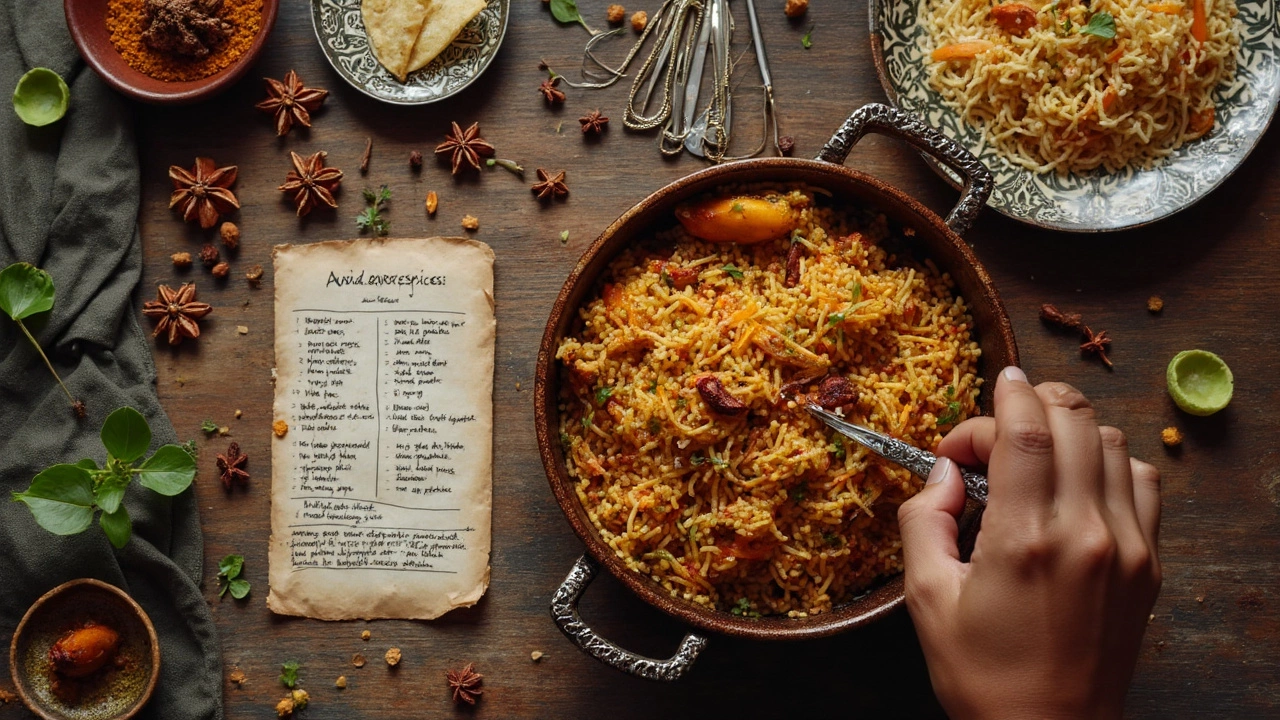You finally dig into that plate of steaming biryani, expecting a burst of flavors, and then—bam!—a nasty bitter note hits your tongue. It happens more often than you’d think, and it can ruin what should be comfort food heaven.
Bitter biryani is almost always tied to something in your spice box. Cardamom pods, cloves, black cumin (shahi jeera), or those tiny bits of bay leaf can send a one-two punch of bitterness if you’re not careful. Sometimes, it’s not even the spice itself, but an overcooked or burnt spice that turns the whole thing awry.
No need to play guessing games. Knowing exactly what to watch out for in each step makes a difference. A lot of home cooks accidentally let whole spices fry too long, or pile in too many of them, thinking “more is better”—when it really isn’t.
- What’s Usually Behind That Bitter Taste?
- Common Culprits: Spices That Bite Back
- How to Prevent Biryani from Getting Bitter
- Quick Fixes: What to Do If Bitterness Strikes
What’s Usually Behind That Bitter Taste?
If you’re wondering why your biryani sometimes develops a strong bitter bite, you’re not alone. Most of the time, it’s not one big mistake, but one of a handful of common reasons. Let’s zero in on the main troublemakers in the kitchen.
The top reason is using whole spices badly. When you toss in black cardamom pods, cloves, bay leaves, or star anise, they can go from tasty to harsh real fast. Whole spices left in too long or added in big amounts release bitter oils instead of their best flavors. Even a cracked clove or a stale bay leaf can throw the balance out of whack.
- Over-toasting or burning spices by frying them in hot oil too long—a few extra seconds make a lot of difference.
- Using ground spices past their prime. Old garam masala, stale cumin powder, or coriander can taste bitter and flat.
- Adding too many bitter spices at once (like too much cardamom or black cumin).
- Biryani burnt at the bottom (‘dum’ gone wrong) infuses a bitter, smoky taste into the rice.
It’s not always the cook’s fault, either. Cases of bitter aftertaste have even turned up in restaurant biryani when bulk spice mixes aren’t stored right. If you want a quick visual guide, here's a rough rundown of which ingredients could be biting back, and how likely they are to cause bitter flavors:
| Ingredient | How Often Causes Bitterness |
|---|---|
| Black Cardamom | High |
| Cloves | Medium |
| Bay Leaf | Medium |
| Burnt Onions | Low |
| Overcooked Spices | High |
Biryani isn’t supposed to have a bitter aftertaste. If you notice it, something likely went sideways with the spice handling or timing. Catching these small missteps in your biryani recipe makes a huge difference for that perfect bowl next time.
Common Culprits: Spices That Bite Back
If there’s a weird bitter taste lurking in your biryani, certain spices are almost always involved. Let’s get specific—no guessing games here.
Cloves (laung) are tiny but pack a punch. Using more than four or five in a regular family-sized batch can make the whole pot taste harsh and bitter. Same goes for black cardamom. While it adds a smoky depth, the husk is naturally bitter and can overpower the rice if you’re heavy-handed.
Now, bay leaves (tej patta)—these are supposed to give a subtle flavor, but if you leave them in while serving, someone might end up chewing on one. That’s instant bitterness nobody signed up for. Always fish them out before dishing up.
Shahi jeera (black cumin) and mace (javitri) can also add edge. Not ruined by a tiny sprinkle, but go even a spoon overboard and you’ll taste their bitter side.
- Over-toasted spices: Burnt spices are the #1 culprit for explaining that sudden, intense bitterness. As soon as your kitchen smells a little too “smoky,” you’re already flirting with disaster. Browning whole garam masala is fine, but don’t let them go black.
- Fenugreek seeds (methi): These are notorious for being super bitter. A few go a long way—seriously, think “half a teaspoon” territory in big batches.
- Old spices: You know that forgotten jar hiding at the back? Stale or rancid spices often turn unpleasant, so toss anything that smells funky or off.
Here’s a quick cheat sheet:
| Spice | Bitter Threshold |
|---|---|
| Cloves | 4-5 for family-sized biryani |
| Black Cardamom | 1-2 pods max |
| Fenugreek Seeds | < 1/2 tsp |
| Bay Leaves | 1-2 leaves, remove before serving |
The golden rule: keep whole and strong-flavored spices in check, and always taste as you go. A little restraint is the secret to perfect biryani.

How to Prevent Biryani from Getting Bitter
No one wants their biryani ruined by a bitter surprise. You can totally avoid this mess with just a bit of know-how in the kitchen. The key is paying attention to your spices—the good news is, you don’t need a ton of experience to get it right.
- Go Easy on Whole Spices: Drop in the whole cloves, bay leaves, or cardamom pods, but not too many. Stick to the actual recipe; more isn’t always better. For most recipes, 2-3 cloves or cardamom pods are enough for a standard pot.
- Don’t Burn Your Spices: When you sauté spices at the start, keep an eye out. Wait for the aroma, not for them to turn black. Burnt spices are a fast ticket to bitterness.
- Choose Good Quality Spices: Spices lose their punch as they get old and can taste bitter if they’re bad. Make sure they smell fresh. If they’re stale, toss them.
- Be Careful with Strong Spices: Star anise, mace, or black cardamom have a strong, almost medicinal flavor. Use these sparingly or skip them if you don’t like risk.
- Remove Whole Spices Before Serving: If biting into a whole clove or cardamom pod isn’t your thing, fish them out or tie them in a small muslin bag (potli) while cooking and pull it out before serving.
Here’s a handy table to show the ideal count of common biryani spices:
| Spice | Ideal Amount for 1 Cup Rice |
|---|---|
| Cloves | 2-3 |
| Green Cardamom | 2-3 |
| Bay Leaf | 1 small |
| Black Cardamom | 1 (optional or halve it) |
| Star Anise | 1/2 (optional) |
One more tip: add any ground spices (like garam masala) toward the end of cooking. If you add them too soon, the flavors can break down and turn sharp or bitter. With these steps, your biryani recipe should turn out flavorful—and free of unwelcome bitterness.
Quick Fixes: What to Do If Bitterness Strikes
Alright, you’ve just tasted the biryani and that unexpected bitter kick is in there. Don’t panic. There’s hope—and some easy ways to save your dish before dinner is ruined. Here’s what you can do, step by step, to rescue your biryani from a bitter ending:
- Find and remove whole spices: Most of the time, the bitterness comes from a clove, a sneaky cardamom pod, or maybe a chunk of burnt bay leaf. Take a couple of minutes, grab a fork or spoon, and fish out any visible whole spices. Your teeth will thank you too!
- Add a bit more rice: If you’ve got extra cooked rice on hand (even plain), mix it in. This spreads out the bitter flavor so it’s less harsh. Works great if you’re feeding a crowd.
- Toss in some dairy: Stir in a dollop of plain yogurt or a splash of cream. Dairy smooths out sharp flavors and tames bitterness better than you’d think.
- Balance with a little sweetness: Sometimes, just half a teaspoon of sugar can mellow the bitter notes. Try honey or raisins for an extra flavor twist—start small and taste as you go.
- Brighten with lemon juice: Squeeze a bit of fresh lemon juice over the biryani. Acid cuts through bitterness and livens up the whole dish. Go easy—a little goes a long way.
Here’s a quick look at which fixes target the most common bitter ingredients:
| Bitter Ingredient | Best Quick Fix |
|---|---|
| Whole spices (clove, cardamom, bay leaf) | Remove and add more rice |
| Burnt onions or overcooked spices | Add yogurt/cream, remove burnt bits |
| Too much black cumin (shahi jeera) | Sugar/lemon juice, and add rice |
If you ever get stuck with biryani that’s just too strong, you can also serve it with a cooling side—cucumber raita or just plain yogurt helps mask the bitterness too. Don’t toss out the whole batch. With these tricks, you’ll be ready for bite two.
